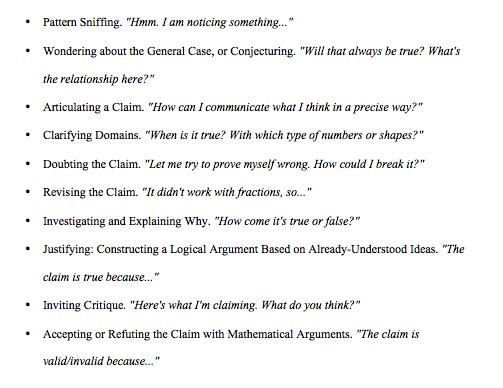I've been thinking more about articulating claims, and proof, this term so I was pleased when Tracy tweeted:

Looking for pushback. How's this draft descrip of math reasoning? Synthesizing several sources. (Imagine as flow.) pic.twitter.com/KhjW5k9UkJ
— Tracy Johnston Zager (@TracyZager) June 27, 2015
Sometimes tweets are too short. Kristin Gray needed to respond with a blog post.
Mike Flynn had an addition:
@MathMinds @TracyZager No pushback but a suggested add-on. "Applying the rule (or claim)" Putting these ideas to work in novel situations
— Mike Flynn (@MikeFlynn55) June 27, 2015
Let me go through this and add a few of my thoughts.
- Of course, all this happens within a situation where the initial pattern sniffing is encouraged. The slow-time question, "what do you notice?" is great for catalysing this kind of thinking Another set up is to give out resources and constraints and ask for exploring and noticing. And there's the kind of number talk when you're looking at something like this, and someone notices another way of constructing a number sequence.
- If we hadn't already had a packed lesson, I might have got the Cuisenaire rods to try and construct the sequence in the way the red numbers show. Then everyone would have had the chance to experience that understanding.
- Which brings me on to my next thought, which is that Kristin is right about the “Extending Pattern Using the Pattern”stage. Students need to play a little here. Does it work if I carry it on? It's great with rods or other manipulatives, but whiteboards and pens or pencil and paper are fine for experimenting too.
I was privileged to talk with Tracy, Mike, Kristen, Elham and Virginia Bastable (co-author of the great Connecting Arithmetic to Algebra) tonight! I also encountered Wendy for the first time. Here we are, looking very pensive:
- And talking with Tracy tonight (talking!) she says words to the effect: we don't have to expect children to work through these somehow programatically or sequentially. I know what she means. The teacher would be taking back the torch from the children. Virginia Bastable agreed, you can just focus on part of this progression for a while, then later take on another part. This is liberating for anyone, which includes me, who feels getting the "full house" might be wonderful, but also wonderfully rare. All this can be diachronic -happening over time. Record it on the claims board, come back to it later, when you and the students have all had time to reflect, or to come at it with fresh eyes.


No comments:
Post a Comment